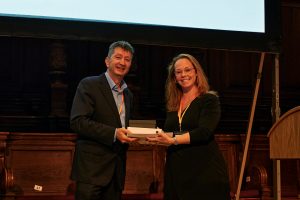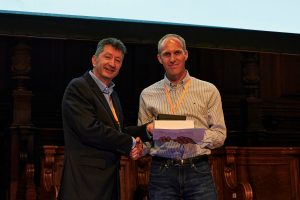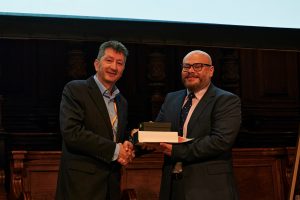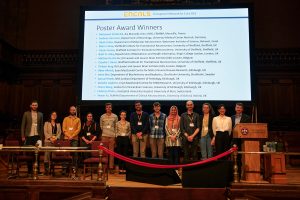During the ENCALS meeting 2022, Prof. Amar Al-Chalabi awarded three young researchers with the ENCALS Young Investigator Award. They have received this award for their outstanding research on ALS.
Chen Eitan – Weizman Institute of Science (Israel)
 While the non-coding genome is substantially larger than the protein-coding genome, the lack of appropriate methodologies for identifying functional variants limits genetic association studies in non-coding genomic regions. Since these regions were overlooked, the goal of my projects was to test for the first time the hypothesis that genetic variants in regulatory non-coding genomic regions – such as miRNA genes and 3’UTRs – may be determinants of susceptibility to ALS, a devastating motor neuron disease.
While the non-coding genome is substantially larger than the protein-coding genome, the lack of appropriate methodologies for identifying functional variants limits genetic association studies in non-coding genomic regions. Since these regions were overlooked, the goal of my projects was to test for the first time the hypothesis that genetic variants in regulatory non-coding genomic regions – such as miRNA genes and 3’UTRs – may be determinants of susceptibility to ALS, a devastating motor neuron disease.
Taken together, my works contribute to an emerging paradigm that emphasizes the role of non-coding regulatory regions in human neuro-genetics. My studies combine computational human genetics and functional experiments in disease-relevant stem cell biology and suggest potential therapeutic targets for neurodegeneration.
Ruben van Eijk – University Medical Centre Utrecht (the Netherlands)
 My research has focused on improving and advancing the design and conduct of clinical trials for ALS, thereby optimizing the use of time and resources, minimizing patient exposure to ineffective treatments, and increasing the number of patients that can participate in clinical trials.
My research has focused on improving and advancing the design and conduct of clinical trials for ALS, thereby optimizing the use of time and resources, minimizing patient exposure to ineffective treatments, and increasing the number of patients that can participate in clinical trials.
My research has led to several unique solutions that now find their uptake in various international clinical trials (e.g., MetFlex (phase 2), Lighthouse II (phase 3), MAGNET (phase 3), Amylyx (phase 3), Corcept (phase 2), Ferrer (phase 3)), while multiple industry partners are implementing elements in their designs and protocols (e.g., NeuroSense, Clene Nanomedicine, BrainEver, Immunity Pharma). These innovations will not only allow more patients to participate in clinical trials, but also make better use of the available resources, thereby reducing costs, optimizing the required number of patients, and minimizing study durations and exposure to placebo.
Ahmad Al-Khleifat – King’s College London (United Kingdom)
 My research attempts to explain ALS phenotype through genotype, focussed on structural variation and disease progression, using bioinformatics as a means of bringing these elements together.
My research attempts to explain ALS phenotype through genotype, focussed on structural variation and disease progression, using bioinformatics as a means of bringing these elements together.
I have explored the relationship between ALS phenotypes, disease progression, survival and genetics; developing and using various tools for measurement and assay of these parameters. My work has led to the discovery of a number of genetic factors that contribute to the risk of ALS with some being investigated further given their potential as drug targets for the development of new therapies. As a result of my research, within 3 years of obtaining my PhD, I was able to secure two competitive fellowships and over £1 million worth of funds
The award
The ENCALS Young Investigator Award was designed to recognize the brightest and best young scientists in ALS, and is given for outstanding research. It is judged by the ENCALS Award Committee, an international panel of experts. Criteria include any or all of novelty, challenge to existing ideas about ALS, results with patient benefit, and impact on our understanding of ALS.

Earlier recipients of the ENCALS young investigator award were:
- Jan Veldink from University Medical Centre Utrecht, the Netherlands in 2011
- Martin Turner of Oxford University, UK in 2012
- Luc Dupuis from the University of Strasbourg in France in 2013
- Ashley Jones from Kings College London in 2014
- Edor Kabashi, ICM, Paris in 2015
- Francesco Pagnini, Catholic University of Milan in 2016
- Jonathan Cooper-Knock, the Sheffield Institute for Translational Neuroscience in 2017
- Russell McLaughlin from Trinity College Dublin in 2018
- Axel Freischmidt from Ulm University in 2019
- Tatyana Shelkovnikova, the Medicines Discovery Institute, in 2020
- Alfredo Lacoangeli, University of Rome, in 2021
All of these high profile researchers have been continuously dedicated to ALS research and strengthen the ENCALS network with their involvement in international research collaboration.
All photo’s are taken by: MAVERICK PHOTO AGENCY – credits to University of Edinburgh